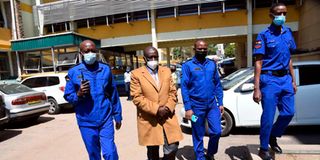Premium
Gachaguas' arrest, arraignment not political, says DPP

Mathira Member of Parliament Rigathi Gachagua being escorted by police officers into Milimani Law Court in Nairobi on July 26, 2021.
The Director of Public Prosecutions (DPP) Noordin Hajj has denied claims that the arrest and arraignment of Mathira MP Rigathi Gachagua was politically instigated.
Mr Hajj instead said that the investigations file had enough evidence for him to be prosecuted in court.
The DPP said they went through the MP’s file and found enough evidence for him to be taken before the court.
“We went through his files as received from the Directorate of Criminal Investigations (DCI) and found compelling evidence for us to prosecute him,” he said.
Mr Gachagua was arrested last Friday from his Mathira home by DCI, following alleged tender involving companies associated with him, with over Sh12 billion said to have passed through his accounts.
He was charged in court yesterday with six counts including conflict of interest, conspiracy to defraud the Nyeri County government, fraudulent acquisition of public property and money laundering among others. Mr Gachagua was later released on a Sh12 million bail or a bond of Sh25 million.
He was also ordered to surrender his passport by Milimani law Courts.
His arrest had earlier on, caused heated discussion among Deputy President William Ruto’s allies who claimed Mr Gachagua’s arrest was associated with the ongoing political wrangles between Jubilee and UDA.
But, the DPP has assured the arrest of the MP had nothing to do with politics, and that his office had found enough evidence for Mr Gachagua to be charged before a court.
“If he was released it on bail, it was because everyone has a right to that as prescribed in the constitution. But we have the files with us, and it indeed shows a fraud was committed. We shall present this in court,” said the DPP, noting that his office is blamed when people land in trouble, yet he only follows the law.
"When we receive a file and we discover it does not have enough evidence to sustain prosecution, we return them back to DCI or EACC, he says.
Mr Hajj said his office has more than 50 cases of politicians who are being prosecuted for fraud.
"There are many such cases, I cannot clearly give out a specific number. But we have the cases with us, and they are more than 50," said Mr Hajj.





